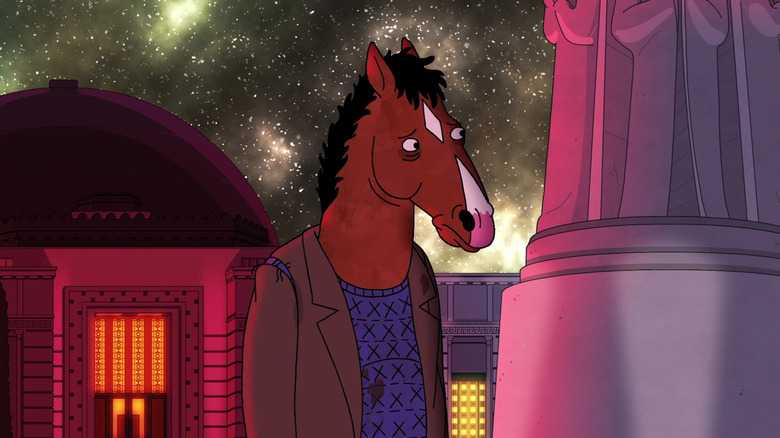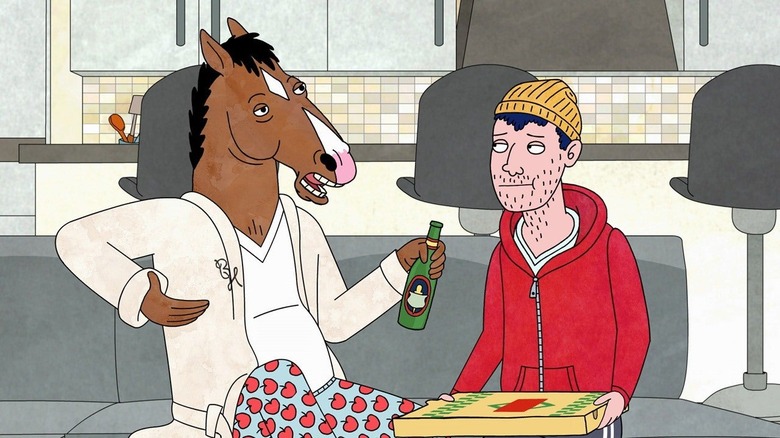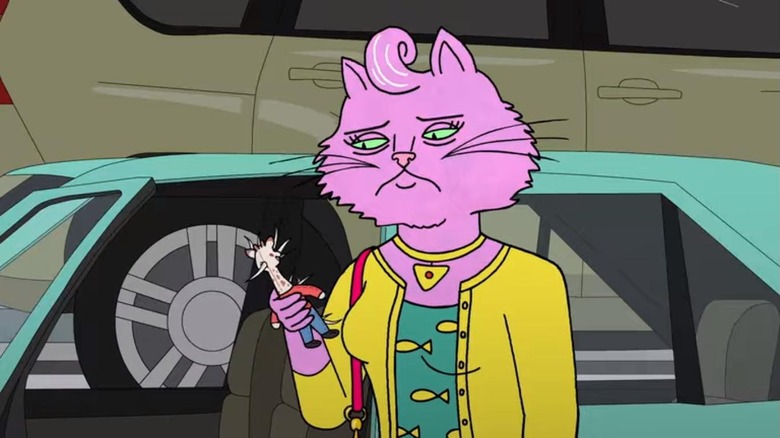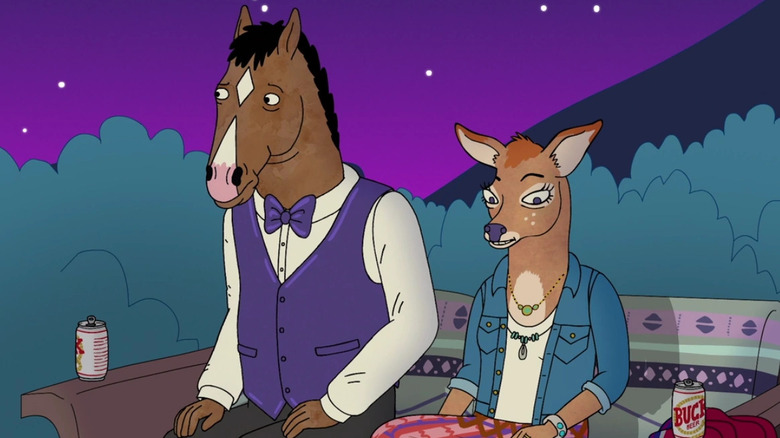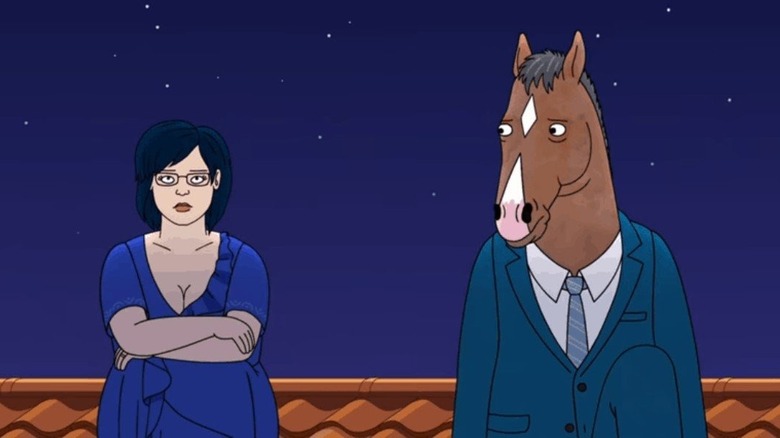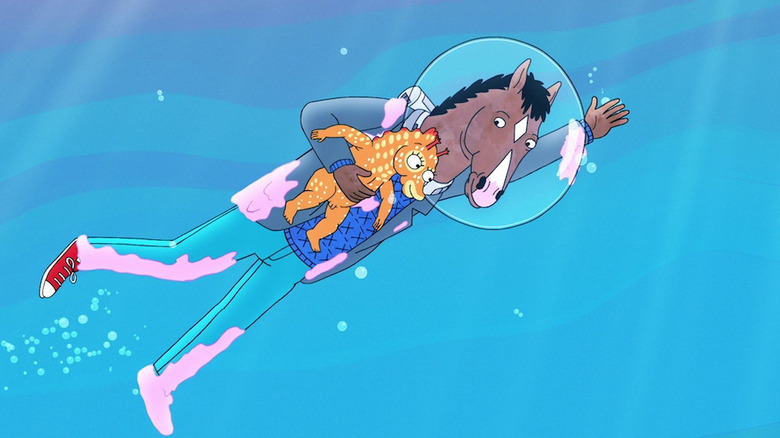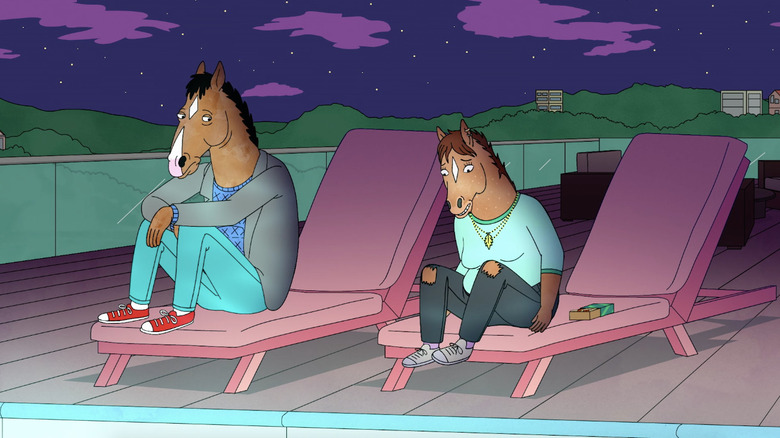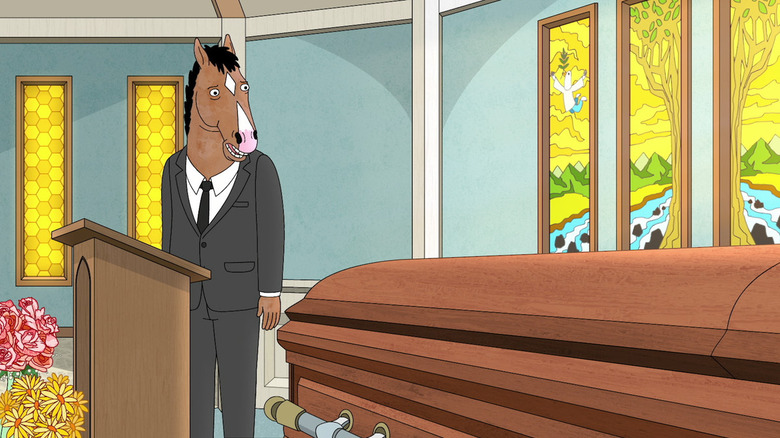Every Season Of Bojack Horseman, Ranked Worst To Best
"BoJack Horseman" is one of the best projects that Netflix has ever created. An odd mishmash of genres, it's a show that could only exist within the streaming era. The series refuses to abide by a formula — constantly upending the viewer's expectations. Animated comedy shows for adults have evolved since the initial success of "Family Guy" and "South Park." While "BoJack Horseman" has its fair share of crass humor, it's a remarkably earnest examination of celebrity culture, depression, substance abuse, and non-traditional relationships in the 21st century. Who would have thought a show about a talking horse would become one of our generation's most insightful series?
"BoJack Horseman" takes place in a somewhat recognizable version of reality, where anthropomorphic animals exist alongside humans. Although the actor BoJack (Will Arnett) received syndicated sitcom fame in the 1990s — thanks to his role in "Horsin' Around" — he's become a recluse in the 2000s. As BoJack's manager and ex-wife, Princess Carolyn (Amy Sedaris), attempts to relaunch his career, BoJack works with a ghostwriter, Diane Nguyen (Alison Brie), on an autobiography.
Across its five seasons, "BoJack Horseman" goes to some very dark places as its characters reflect on their traumas. Despite the emotional intensity of its later seasons, there's always room for animal puns and popular culture references in "Bojack Horseman." The series wrangled in an impressive number of guest stars and never lost its unique sense of humor. Here, we explore the best and worst seasons of "BoJack Horseman."
If you or someone you know needs help with mental health, please contact the Crisis Text Line by texting HOME to 741741, call the National Alliance on Mental Illness helpline at 1-800-950-NAMI (6264), or visit the National Institute of Mental Health website.
7. Season 1
While season 1 of "BoJack Horseman" is not bad by any means, it resembles more mainstream adult animated shows than what it'll eventually become. The first few episodes are still entertaining and feature hilarious satire. The episode "BoJack Hates the Troops" compellingly examines the complex relationship that the news media has with patriotism. BoJack argues with a Navy SEAL (Patton Oswalt), who accuses him of being anti-military. Somehow, BoJack hilariously finds himself at the center of a political debate over America's armed services and their role overseas.
However, the "Say Anything" episode gave us our first taste of the series' early development of more mature themes and subject matter. "Say Anything" changed the tone of the series by focusing on Princess Carolyn's stressful life. Despite her upbeat demeanor with her clients, Princess Carolyn is lonely and wants to raise a child. She knows BoJack will never be a suitable father, and she hates herself for going back to him. BoJack also goes through a midlife crisis later on in the season — regretting his past mistakes in snapping at Diane. He begs her to tell him that he's a good person, and her silence is absolutely heartbreaking for BoJack and the audience.
If you've never seen "BoJack Horseman" before, it's worth watching past the first six episodes to see this transition. Still, it was a strong start for a series that only improved from there.
6. Season 6a
Similar to drama shows like "Breaking Bad," "Mad Men," or "The Sopranos," the final season of "BoJack Horseman" was released in two chapters a few months apart. While the first half of season 6 admirably sets up the series' conclusion, it's balancing several storylines that don't always blend well. BoJack's complex relationship with Hollyhock (Aparna Nancherla) doesn't receive much-needed attention. There aren't enough details to know how they (and their relationship) evolved since season 5.
Although the series fleshes out Mr. Peanutbutter (Paul F. Tompkins) into more than a funny side character, his dramatic storylines aren't as compelling. Season 6a spends a lot of time exploring Mr. Peanutbutter's relationship with Pickles (Julia Chan). Initially, it's amusing to see Mr. Peanutbutter in a compromising situation when he cheats with Diane. But ultimately, the move feels like it's padding out the season.
Season 6a introduced an interesting storyline: BoJack emerges from therapy to become a drama teacher at Wesleyan University, where Hollyhock attends. BoJack's interactions with his students are funny: Even when he's trying to be a mentor, BoJack can't help stroking his ego. Also, there's a compelling storyline where Todd Chavez (Aaron Paul) realizes he may have found a potential partner in the Cinnabon worker Maude (Echo Gillette), who is also asexual — delivering viewers a touching moment of representation.
5. Season 2
Season 2 is a near-perfect set of episodes, so it's hard to rank it low on the list. But this is only because the show grew more complex and reflective in later installments. Still, this season features some powerful flashbacks to BoJack's past that establish why the role of Secretariat means so much to him. The show has always had a complex relationship with its titular character: Yes, we sympathize with him, but the show never asks us to absolve Bojack. Overall, this season trekked into some uncomfortable territory toward its conclusion when BoJack encountered a flame from his past.
In season 2's penultimate episode, "Escape From L.A.," BoJack discovers that his old friend Charlotte (Olivia Wilde) lives with her husband, Kyle Carson (Ed Helms), and daughter, Penny (Ilana Glazer), in Arizona. BoJack and Charlotte flirted in the past, and he wonders what his life would have been like if they had formed a long-term relationship. The episode darkly turns when the underage Penny tries seducing BoJack, and Charlotte catches them in the act. It's one of the most haunting moments of "Bojack Horseman." BoJack invites trouble wherever he goes, and this incident gives him a sense of guilt that remains with him for the rest of the series. The experimental season 2 finale, "Out to Sea," took the series in a new direction. The incorporation of David Lynch-inspired dread was a stylistic departure from traditional animation.
If you or anyone you know has been a victim of sexual assault, help is available. Visit the Rape, Abuse & Incest National Network website or contact RAINN's National Helpline at 1-800-656-HOPE (4673).
4. Season 6b
Given the heavy amount of anticipation from devoted fans, the season finale of "BoJack Horseman" had a lot to cover. While any popular show will naturally incite interest in its final season, "BoJack Horseman" was a series that helped many fans deal with their issues. "BoJack Horseman" was where many audiences saw themselves represented for the first time, and it's rare to see such a frank discussion of mental health issues on screen. The show continued to offer insight and inspiration to viewers with mental health illnesses.
Fittingly, "BoJack Horseman" ends on a muted note. The series isn't overtly saccharine or dire, reflecting the show's careful balance of themes. Life goes on no matter what, and it ends in a suggestive way that the characters will do just that: After everything, they'll continue living and accept their flaws. "BoJack Horseman" never intended to redeem its central character. However, its ending offers viewers a glimpse of hope — despite the complicated road ahead for BoJack's recovery.
The penultimate episode, "The View from Halfway Down," is BoJack's rock bottom. Given all of his sordid activities, that is no small statement. After experiencing a mental breakdown and binge drinking, BoJack becomes trapped in a recurring dream where he assumes he's dying. Even for BoJack, this episode is quite disturbing. Thankfully, the season finale, "Nice While It Lasted," takes things in a slightly more optimistic direction — showcasing BoJack making peace with Diane.
If you or someone you know needs help with mental health, please contact the Crisis Text Line by texting HOME to 741741, call the National Alliance on Mental Illness helpline at 1-800-950-NAMI (6264), or visit the National Institute of Mental Health website.
3. Season 3
Season 3 featured some of the most heartbreaking moments in the series run. This season was so dour that it felt like some of the show's signature humor went missing. BoJack continues wrestling with his past mistakes, and some intriguing flashbacks shed insight into his emotional development. "The BoJack Horseman Show" episode explores some of the issues he had with Princess Carolyn when first dating, including how BoJack's ego self-sabotaged him. The flashbacks to a younger Sarah Lynn (Kristen Schaal) make her ill-fated storyline at the end of the season even more devastating in the penultimate episode, "That's Too Much, Man!"
Still, season 3 excels at developing the show's side characters. Todd's discovery that he is asexual was a beautiful moment of representation for a group seldom portrayed on screen. Even though Mr. Peanutbutter's character gives comic relief, season 3 shows he's more sensitive than he appears. Quieter moments between him and Diane as they consider parenthood show why they fell in love in the first place.
The episode "Fish Out Of Water" is easily the most visually inventive installment in the entire series. In an episode nearly absent of dialogue, BoJack attends a film festival in the Pacific Ocean and gets lost. This episode proved that the show's animation department was just as ambitious as its writing staff.
If you or someone you know needs help with mental health, please contact the Crisis Text Line by texting HOME to 741741, call the National Alliance on Mental Illness helpline at 1-800-950-NAMI (6264), or visit the National Institute of Mental Health website.
2. Season 4
Season 4 spends as much time exploring BoJack's family history as it satirizes Hollywood and celebrity culture. While this may have forsaken the central conceit of the series, it proved that "BoJack Horseman" was determined to play by its own rules. BoJack's life seemingly had been defined by his relationship with Hollywood: But the viewers needed to see his problems didn't start there. While the emotional revelations are just as shocking as anything in the previous seasons, the writers effectively include an element of mystery that keeps the audience guessing about BoJack's relationship with Hollyhock until the very end.
The most surprising character in season 4 is BoJack's mother, Beatrice (Wendie Malick). While earlier seasons solely focused on Beatrice as a neglectful and abusive parent, season 4 showed the emotional trauma Beatrice suffered during her adolescence. (This is what makes the show so genius!) Again, it never absolves Beatrice or BoJacks' bad behavior, but it shows that they are victims as much as they are abusers. Like in real life, understanding why people hurt others (and preventing it) isn't a simple problem to solve.
Season 4's final two episodes demonstrate the complex tonal balance the series excelled at landing. While "Time's Arrow" is gut-wrenching in what it reveals about Beatrice's past, "What Time Is It Right Now" gives BoJack something hopeful to look forward to in his life.
If you or someone you know may be the victim of child abuse, please contact the Childhelp National Child Abuse Hotline at 1-800-4-A-Child (1-800-422-4453) or contact their live chat services.
1. Season 5
As it entered its fifth season, "BoJack Horseman" changed animation forever. With some critics listing it as one of the greatest animated shows of all-time, the series risked being ignorant of its influence on pop culture. Season 5 allowed the series to analyze itself through its signature meta techniques. As BoJack stars in the drama series "Philbert," he finds that his new anti-hero personality has made him more popular. The show asked its audience to question: If viewers become too invested in BoJack, does the series risk dismissing his dangerous behavior and crimes? Given this season's coverage of sexual assault in Hollywood, the writers brilliantly examined celebrity culture in the post-#MeToo era.
Although we saw glimpses of the problematic production of "Horsin' Around" in the show's earlier episodes, season 5 spotlighted what a dramatic series like "Philbert" looked like in the "BoJack Horseman" universe. Season 5 still found room for storylines outside the entertainment industry, including Diane's trip to Vietnam, Todd's new business venture, and Mr. Peanutbutter's relationship with Pickles. Even a side character like the showrunner Flip McVicker (Rami Malek) proved to have more layers than his callous attitude suggested.
While season 5 may have been the funniest installment in the series yet (including an all-time great joke about the pronunciation of "NCIS"), it was also the show's most earnest exploration of grief. BoJack's reflections on his mother's death in "Free Churro" show the complex feelings that arise for a child when an abusive parent dies.
If you or someone you know may be the victim of child abuse, please contact the Childhelp National Child Abuse Hotline at 1-800-4-A-Child (1-800-422-4453) or contact their live chat services.
If you or someone you know needs help with mental health, please contact the Crisis Text Line by texting HOME to 741741, call the National Alliance on Mental Illness helpline at 1-800-950-NAMI (6264), or visit the National Institute of Mental Health website.
